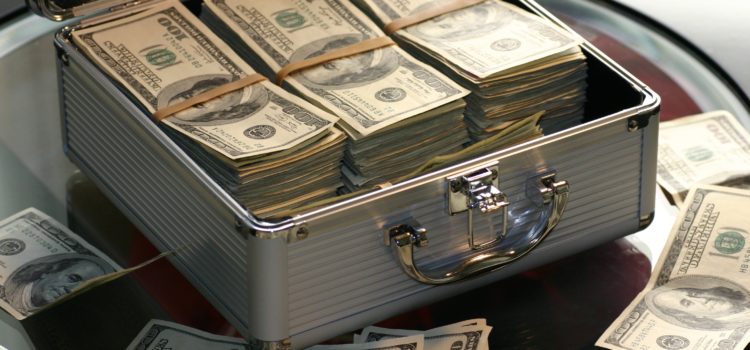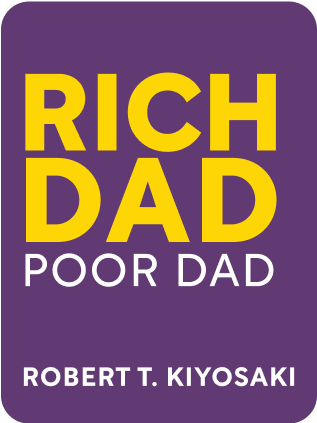

This article is an excerpt from the Shortform summary of "Rich Dad Poor Dad" by Robert T. Kiyosaki. Shortform has the world's best summaries of books you should be reading.
Like this article? Sign up for a free trial here .
Is it true that the rich don’t work for money? How is that possible, and how can you make it happen for you?
In Rich Dad, Poor Dad author Robert Kiyosaki points out that the rich don’t work for money; they make money work for them. By investing and other tactis, the rich are rich because they generate cashflow from sources other than a day job. In the book, it’s true that the rich don’t work for money. Luckily, the book also gives advice on how you can achieve this, too.
Why The Rich Don’t Work for Money
The premise: when growing up, author Robert Kiyosaki had two dads advising him: 1) a Stanford-educated PhD who followed traditional career thinking, was allergic to risk, and was financially illiterate (the Poor Dad, his biological father); 2) a high school dropout who later built a business empire worth many millions and employing thousands (the Rich Dad, his best friend’s father).
The Poor Dad represents the traditional view on work and money – go to school, get a good job and climb the ladder, prize stability over independence, buy a house, and spend money without a clear long-term plan.
- Most parents belong to this system, so they pass it down to their kids.
- The traditional view worked better in the 20th century, when strong growth and decades-long employment meant stability was a viable strategy. Nowadays, pensions are rarely guaranteed; job security at a loyal employer is rare; professional education and academic success are no longer guarantees for security.
The Rich Dad represents what was then a more contrarian view – work for salary if you have to, but aim for financial independence; have your money generate more money; and take calculated risks boldly. Rich Dad argues that the rich don’t work for money, and you can learn how to have this life, too.
Most people adopt the Poor Dad view of finances and life. Even worse, they let money control their life:
- Fear of not having money makes people work hard.
- Then once they get a paycheck, greed gets them to buy things they covet.
- But the joy is short-lived. As they spend unwisely, they have money problems, and the fear of not having money drives back in. They have to go back to work to get the next paycheck.
- This cycles endlessly, even as their paychecks increase with raises – this is the Rat Race. Money ends up running their lives. They get stuck in jobs they dislike for the sake of money.
The Rich Don’t Work For Money – Money Works for Them
With the narrative over, the rest of the book covers Robert Kiyosaki’s major lessons from Rich Dad.
Most people work 40+ hours a week to earn salaries. Many then take their earnings to 1) buy stuff they think will make them happy (but this is short-lived), 2) save the remainder in a conservative way.
While this ensures some degree of stability, it doesn’t make you rich. And working to earn a pension makes you financially dependent – let alone the risk that pensions won’t be funded decades from now, when you need it.
The counter-intuitive lesson here is this: the rich don’t get rich merely by being paid higher salaries (though this is a great help). They get rich so by owning things. No one on the Forbes billionaire list got there purely with a salary. In short: the rich don’t work for money. This is one of the main lessons of Rich Dad on achieving financial independence.
(As tech investor Sam Altman says, “You get truly rich by owning things that increase rapidly in value. This can be a piece of a business, real estate, natural resource, intellectual property, or other similar things. But somehow or other, you need to own equity in something, instead of just selling your time. Time only scales linearly.”)
When you work for an employer, you get paid only a fraction of the value that you generate for the employer (otherwise, if the business would go bankrupt). Say your salary is $50k a year. Your work may allow your employer to earn $100k in sales that year, yielding a clean profit after deducting your salary.
- Even further, if your work isn’t just a pure service but also builds value in the company – say in R&D or product improvement – the value may be many multiples of your salary.
The key to financial independence is having money that makes more money. You want your money to make enough money that you don’t have to work anymore. This is how the rich don’t work for money.
Assets
So, if the rich don’t work for money, how do they get money? With investments and assets. In order to make enough money to not have to work, you’ll need assets. But what are real assets?
- Businesses that don’t require your presence. You own them, but they’re managed by other people. If you have to work there for it to generate money, it becomes your job.
- Only start a business if you have a desire for it. The odds are against you and the stress is high. You don’t have to make money this way.
- Stock, bonds, funds, and other securities.
- Kiyosaki once liked tax liens, which he claims returned 16%, but says since then more attention has made this less profitable.
- Income-generating real estate. In particular:
- Using debt to lever up on more houses. In other words, with $500k, you could buy one $500k house and use it to make income. Or, you could pay $100k down payments for 5 houses and get rental income from 5 houses.
- (Shortform caveat: note that with more leverage, if the houses lose value, you also magnify your losses, as in the 2008 recession.]
- Buying under-market properties, like from foreclosures, and reselling them quickly.
- Kiyosaki notes that today foreclosures are competitive and he’s looking elsewhere.
- Using steady cash flow from rental income to make riskier bets, like in the stock market.
- Consider buying property that’s larger than what you need. Then sell off a piece to someone else. This will let you broaden the opportunities you find.
- When selling a property, trade it for a larger one to avoid immediate taxes on the gain. (Section 1031)
- Using debt to lever up on more houses. In other words, with $500k, you could buy one $500k house and use it to make income. Or, you could pay $100k down payments for 5 houses and get rental income from 5 houses.
- Notes (IOUs).
- Royalties from intellectual property such as music, scripts, patents.
- Anything that has value, produces income, appreciates, and has a ready market.
(Shortform note: Rich Dad, Poor Dad contains lots of (possibly embellished) examples of super-profitable real estate deals. Unfortunately the book doesn’t cover how to find or generate valuable assets, which is a much more complicated topic and specific to the industry.)
Think about each dollar as your employee that works 24 hours a day tirelessly to make you more money.
The tradeoff between today’s expenses and future income should be clear. Every dollar you spend today is a dollar that does not work for you again, in perpetuity.
Further, avoid situations where you have to dip into savings or investments. Find creative ways to come up with the money, and protect your assets.
So now you know why the rich don’t work for money. As you take steps toward financial independence, remember that the rich don’t work for money, and if you’re going to achieve your financial goals, you should emulate these strategies.

———End of Preview———
Like what you just read? Read the rest of the world's best summary of Robert T. Kiyosaki's "Rich Dad Poor Dad" at Shortform .
Here's what you'll find in our full Rich Dad Poor Dad summary :
- The key differences in how rich dad and poor dad approached life
- Why it's a terrible idea to buy an expensive house
- How to overcome your own mental blocks to become wealthy for life






